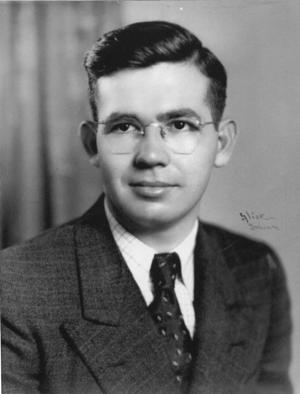| |
 Digital Scrapbook Digital Scrapbook
Estill Goodwin Foster was born in Bishop, Texas June 1, 1913. He got a cornet (ordered from Sears-Roebuck for $9.00, new) and began playing in the band where he quickly established himself as one of the most interested and most talented band students. Upon graduation from high school he wanted to attend college and become a school band director. He was awarded a "Texas Federation of Women's Clubs" scholarship appointment in 1929 at Texas College of Arts and Industries where he was informed that "no one can make a living just teaching band. You will have to major in a real subject and just play in the band, and teach band as an extra activity." During his second year at Texas A & I, Estill learned that it was possible to major in a course of study to become a band director at West Texas State Teachers College, so he transferred to that institution where he graduated in 1933, and later received his Master of Arts degree in 1937.
Upon graduation, he taught in Pampa, and in 1934 he married Norma Jean Burgess. They moved to Raymondville, Texas where Estill organized the high school band in 1934. He served there for six years during which time the band was awarded every sweepstakes award which was given by the Texas Music Educators (according to the Raymondville newspaper). Here he took students to the national contest for the first time, and was awarded his first superior rating at a national contest. Estill was recruited away from Raymondville to become band director at Benavides, and then once again he was enticed to leave and made a move to the Hull-Daisetta school district. World War II interrupted everything and after a stint in the Navy, Estill returned to his home town of Bishop to rebuild the band program which had simply ceased to exist during the war.
He arrived in Bishop in the fall of 1946, started from scratch in September, and presented his first concert with the Bishop band in December, 1946. The band included 44 players ranging in age from second grade to seniors in high school. That same year they marched in the Buccaneer Days parade in Corpus Christi. The band began to compete in the U.I.L. marching, concert, and sight-reading contests, Estill became one of the important pioneer leaders in the band movement in Texas, helping establish and refine the first regional bands and district bands, which led directly to the system of selection for the All-State Band in Texas today.
In February 1949, Estill was elected to membership in Phi Beta Mu. In 1950, the Bishop band was awarded First Division ratings in concert, marching, and sight-reading, becoming the first band in Class B to be awarded the Sweepstakes award in Region VII. The elementary school band (Bishop had no junior high at that time) also received a superior rating.
Estill began working with D.O. Wiley and other band leaders in the state as they continued to refine the structure and organization of TMEA and the All-State programs. He introduced the "blind audition" process to the district and regional structure (at least in south Texas). The year his oldest son, Don, was a senior in high school, Estill served as one of the trombone judges at regional. After the auditions, he went searching for Don and "chewed him out" for not showing up for the audition. He had not realized Don had auditioned and was selected first chair. In 1951 and 1952, Estill served as President of TMEA, and according to Earl Ray, his convention in Mineral Wells may have been the first one to include a Texas All-State Choir.
The Bishop band continued to flourish, dominating the honor bands in that area and providing leadership, and serving as a role model for a small school program. (The town of Bishop was never much larger than 3,000.) A true music educator, Foster's emphasis on ear-training and basic music theory, plus instrumental technique development was his hallmark, and was the basis for the success of his students and of his bands. He taught his students "music" and did not just "have a band".
In 1954, he was honored by being selected to Who's Who in Music, was running a very successful music camp in Corpus Christi in the summers, and was managing a very successful music store in Bishop in addition to his teaching. At the end of the 1956 school year, he resigned from Bishop, and accepted a position in the Kingsville schools (only 6 miles away), where he continued to teach at the junior high level until his death in 1962.
Estill Foster probably served the organization of music educators in Texas in more capacities than any other man in the state. He left a legacy to music education, to young people, to his community, and to his profession that continues to be reflected in school bands and the band movement and profession today, not only throughout Texas and the Texas band organizational structure, but throughout the country through his former students and colleagues.  |